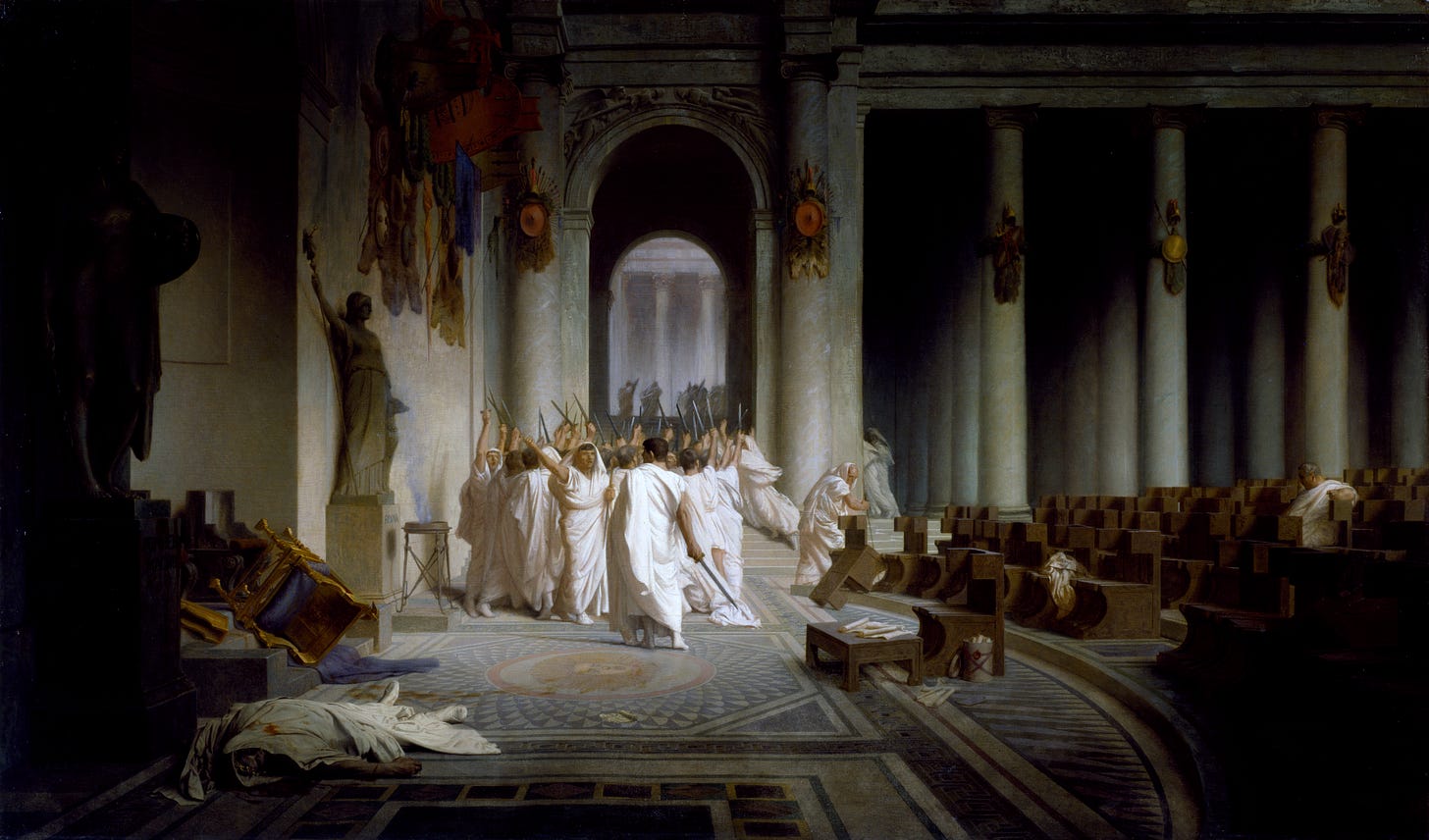
On March 15, 44 BCE, the Roman Republic performed its most sacred ritual: the killing of a demigod. Julius Caesar, Pontifex Maximus—high priest of Rome’s state cult—had long blurred the line between mortal and divine. His assassination did not merely topple a man; it exposed how the Republic itself had become a religion, its institutions and rituals a pantheon of power.
Rome had no official creed, yet everything revolved around sacred ceremony. The Senate met in temples, generals interpreted bird flights as divine will, and citizens swore oaths on the genius of the state.
Caesar was the embodiment of both dictator and high priest. He controlled the calendar, presided over sacrifices, and claimed descent from Venus. When he reformed the grain allotments or pardoned enemies, it was framed not as policy but as piety: acts to maintain pax deorum, the “peace of the gods.” The state’s survival was a divine covenant, its laws divine edicts.
The conspirators understood this. Brutus, descendant of the Republic’s mythic founder, styled himself a defender of its sacred order. To kill Caesar was not just political—it was a purification rite. When the soothsayer warned “Beware the Ides,” it was not superstition but state doctrine: omens were the language of Rome’s civic religion, not to be ignored.
Caesar’s refusal to heed the prophecy became the conspirators’ most potent weapon. By dismissing the warning—“He is a dreamer, let us leave him”—Caesar unwittingly branded himself a heretic in the eyes of Rome’s pseudo-religious bureaucracy. His defiance was not mere arrogance but a violation of the Republic’s divine contract, an affront to the priesthoods and rituals that underpinned the state. An affront to the Pax Deorum. The conspirators seized on this defiance as moral cover, framing their political vendetta as a holy crusade.
In truth, their motives were rooted in fear of losing power. Caesar’s reforms—granting citizenship to provincials, expanding the Senate with loyalists—threatened the aristocracy’s grip on governance. Yet to oppose him openly risked alienating the plebs, who saw Caesar as a populist demigod.
The conspirators weaponized Rome’s civic religion. By casting Caesar as a sacrilegious tyrant who spurned divine warnings, they transformed their coup into divine ritual, a necessary bloodletting to appease the gods and purify the state.
Even the setting was deliberate: the Senate convened in Pompey’s Theater, a space consecrated to Venus Victrix, goddess of victory. To strike Caesar down there was to stage his death as a cosmic reckoning, a divine verdict delivered by mortal hands.
“Bro!” - Caesar probably
In death, Caesar’s cult only grew. The Senate deified him as Divus Julius, and his corpse was cremated in the Forum, the people throwing jewels and furniture into the flames as sacrificial offerings. His adopted heir, Octavian, became Augustus—“the revered one”—and as Pontifex Maximus, he wielded spiritual authority to sanctify his rule. Temples to Caesar dotted the empire, and citizens swore oaths to his genius alongside Jupiter’s. The state had not just replaced religion; it had become one.
The parallels were deliberate. Roman magistrates wore priestly robes (toga praetexta), the Senate debated under temple arches, and military triumphs mimicked religious processions. Loyalty to Rome was piety; dissent, heresy.
When Christians later refused to burn incense to the emperor’s genius, they were persecuted not for their faith, but for rejecting the state’s ultimate sacrament: the worship of itself.
The Ides of March laid bare the underlying truth. Caesar’s killers sought to restore a Republic that never truly existed—a “secular” state was as foreign to Rome as atheism. The Republic’s rituals, myths, and offices were its religion, binding citizens to a pagan god bureaucracy where senators were priests, laws were scripture, and the Forum was a cathedral. Caesar’s murder, framed as a holy act, only proved how inseparable faith and power had become.
Rome’s legacy is a warning: when the state becomes a religion, or conversely, a religion becomes the state, its leaders become gods, its laws become dogma, and dissent becomes sacrilege.
The conspirators’ appeal to divine justice was the pinnacle of political theater. By exploiting Caesar’s dismissal of the soothsayer, they masked their fear of obsolescence beneath a veil of piety. Yet their “holy act” only accelerated the Republic’s demise, paving the way for Augustus’ imperial cult—a state religion that demanded worship of Caesar’s heirs.
In the end, the assassins’ ritual purified nothing. It merely swapped one god-king for another, proving that in Rome, the state’s most enduring sacrament was its capacity to sanctify its own violence.



